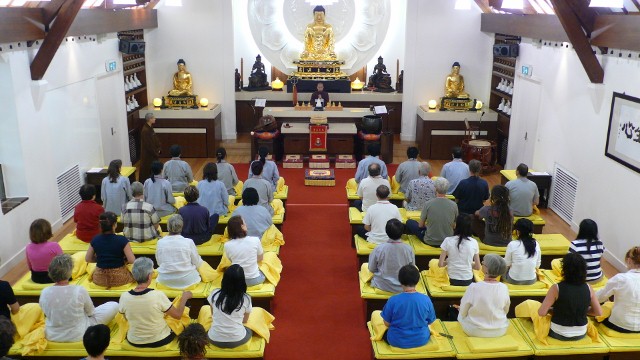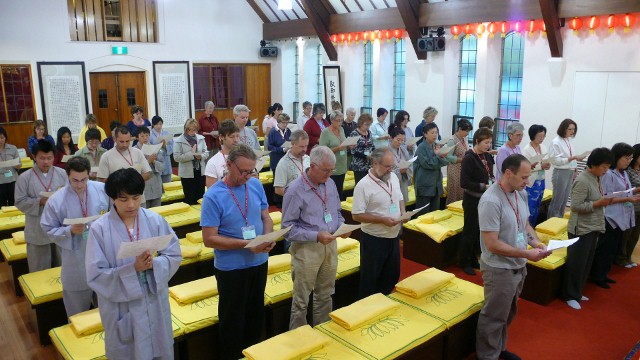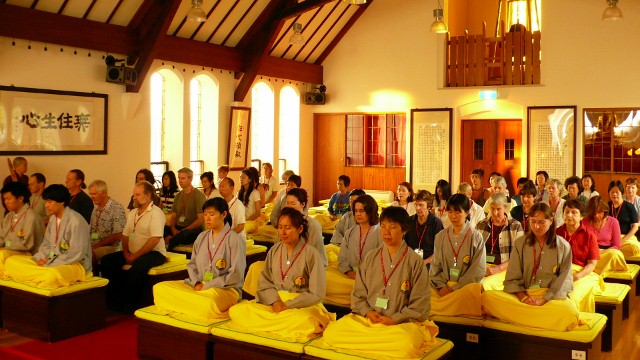Jacques Joubert (Neurologist, English Sutra Study Class)
Recently there have been two events that due to the nature of modern communication have been flashed round the world, and, for a medical practitioner such as myself have been proof that there is beyond the seen world, outside the concepts of scientific materialism, a realm that can influence our physical beings as well as our minds.
The first was the recent documentation of an aged Tibetan Lama, who died in New Zealand, and for a period of over two weeks, although clinically dead as certified by the medical and community authorities, showed no evidence of decomposition of the physical body. The second event was the case of a French Catholic nun, who had severe, incapacitating Parkinson’s Disease and after making aspirations to the Pope John Paul, was totally cured. As a medical practitioner both the physical changes to the body after death, within hours, and the effects of Parkinson’s Disease are easily evaluated.
In both these cases there is no rational explanation for these changes to the natural condition. They are however pointers to the fact that there is another dimension that can override the physical. Moreover, both these events have had their foundation in deep spiritual traditions. The first one is Buddhist, with years of contemplation and mind training underpinning the lama’s life, while the other is Christian, where faith and positive aspirations played a central role. But both point to a similar truth, and it is that truth is what draws one as a student and disciple to come regularly to the Bao Lin Monastery in Melbourne, and to cultivate with Shifus, while the ancient wisdom and practices of Chan are presented at the dharma talks.
These two events also lead to a discussion of a whole new science that is developing and gaining increasing ground at the most prestigious universities both in the United States and Europe. The information that is currently coming from the scientific community is that through studying the effects of the ancient practices of Buddhism in the laboratory, scientists are now demonstrating that the invisible part of ourselves, our mind or consciousness can affect the brain in a way that can be objectively measured, and not only that, but that, but mental processes and positive emotions as such were advocated by the Buddha actually have beneficial effects on our immune system, and produce an interaction between brain and heart. For the first time, the inner world is being exposed to scrutiny, and what was always thought not to be measurable is being measured in the laboratory.
This area of enquiry is called contemplative neuroscience. The neuroscientists are investigating the neuroscientific underpinnings of contemplative practices, mainly in the Buddhist context and in particular seeing how the brain can be transformed through the engagement with purely mental practices, and studying this with the most current technical methods and concepts of neuroscience. Prof Richard Davidson, from the University of Wisconsin says, the brain is the one organ that is built to change in response to experience, which means the intentional deployment of mental strategies can result in an enduring change to both the structure of the brain as well as the mental state. Although not directly stated in such terms, Chan practices such as the committing to memory of the Eight Realizations of Great Beings hint at such an effect. Scientific evidence now indicates that there appears to be a two-directional interaction between the mind and the external world through the medium of the brain. This may have enormous consequences in terms of physical and mental health as well as a significant effect on society as a whole.
Genes are proteins that are present in all cells of the body, and influence how different body parts, including the brain function. Recent scientific evidence has shown that these genes can be affected by experience. Experience (“inner actions” such as thoughts and emotions and “outer actions” such as words) affects the way that these genes operate, and, in fact can change their operations. This has important implications for brain function. It has been stated that there is no known more effective way to introduce changes in the brain than through behavioural interventions. This resonates well with the fundamental concepts and practices of Buddhism. More than two thousand years ago, Buddhism used the laboratories of the mind to research ways of living more harmoniously and happily. One of the pivots for this is the two noble truths that were promulgated by the Buddha, namely that there is suffering and then, that there is a way to end suffering. In the past, in both psychology as well as neuropsychology where the focus has been on the study of negative states of mind. The searchlight has now turned to one of the most important positive emotions, one that if harnessed effectively can change not only individual lives but also societies.
The focus of the scientists was on Compassion. The objects of study were long-term practitioners, mainly monks, who had systematically cultivated compassion over years. They were considered the “experts” in this area. Lay people, who only had one week’s training in meditation on compassion were studied as a comparison group. The evocation of “non referential” compassion—where love and compassion permeates the whole mind, with no object to focus on was the object of meditation. Using functional MRI studies, it revealed that the long-term practitioners showed dramatically different patterns of increased activity visualized on the functional MRI compared to the novice meditators. It means by inference, that cultivating compassion causes something to take place in the brain. On the personal level, the effects of meditation can be enormous and as easily measured with physical instruments and there is the potential for populations, with the introduction of these techniques, to be affected in a positive way.
These findings are not by themselves the reason why Chan Practice and affiliation with the Bao Lin, is for myself, as a medical practitioner a worthwhile undertaking. They do indicate however, that the practices that we are taught at the monastery are powerful ways to influence not only our mind, but through our mind our brains can hopefully produce permanent, positive changes in these structures that will help us to reduce suffering in ourselves and in others.



